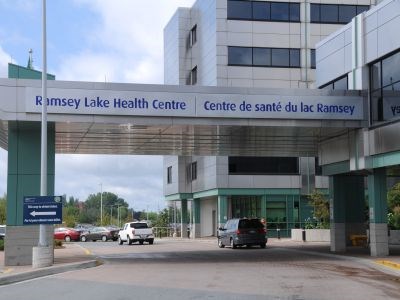Last year's peer review of Health Sciences North was a much-needed “kick in the pants,” according to the hospital's senior vice-president.
The peer review, ordered by the North East Local Health Integration Network and led by Hamilton Health Sciences CEO Murray Martin, examined persistent issues at the hospital, namely its high alternate level of care (ALC) patient rate.
Joe Pilon said the hospital and partners such as the North East Community Care Access Centre (CCAC) had come up with ideas of how to solve these issues in the past, but had never really executed them.
“In trying to figure this out, we had all kinds of good ideas, and we never just sat down and said 'Let's do it,'” said Pilon. “We got that little kick in the pants and kind of said 'Let's do it.' Everybody got together and did it.”
He said there is “no perfect answer” to issues affecting the health-care system.
“We have to try things, and if they're not working, then try something new and change it a little,” Pilon said.
Of the 55 recommendations outlined in the peer review report, 41 are specific to Health Sciences North (HSN).
Of those 41 recommendations, 28 have been completed, nine will be completed by April 1, and the last four will be ongoing work, Pilon told the hospital's board of directors at their Jan. 8 meeting.
There have been improvements in many aspects of the hospital's operations due to the implementation of these recommendations, he said.
The total number of ALC patients at the hospital, including those at the former Memorial Hospital site, have been reduced from 133 in September to 78 in December.
These numbers have dropped, in part, because the hospital has followed a recommendation to designate fewer patients as being destined for long-term care, and sending them home with enhanced home care supports instead.
The designation for these types of patients has dropped from five per week before the peer review to less than two per week.
Another reason for the drop in ALC numbers is that Health Sciences North is actually going against one of the peer review recommendations and closing the ALC unit at Memorial by Jan. 27.
There are currently 14 patients in the unit, which has a capacity of 30.
Murray had recommended the hospital consider keeping the unit open until next fall, but the hospital said it couldn't afford to do so because the cost of maintaining factored into HSN's budgetary concerns.

In trying to figure this out, we had all kinds of good ideas, and we never just sat down and 'Let's do it.'
Joe Pilon,
senior vice-president, Health Sciences North
Another peer recommendation was reducing the amount of time all patients spend in the hospital. Pilon said the hospital has always met the benchmarked expected length of stay.
However, Murray suggested the hospital reduce the length of stay at the hospital to 90 per cent of what's expected. The hospital actually exceeded this recommendation, reaching 86 per cent of the expected length of stay in October.
Pilon said these actions have resulted in a significant improvement in emergency room wait times in November and December.
He did say, however, he's concerned about the impact the city's current influenza outbreak could have. Pilon said the flu isn't currently affecting the hospital, but officials are monitoring the situation.
“Any kind of an influenza outbreak that requires hospital admissions, that's something we're always kind of concerned about.”
As part of the hospital's attempt to avoid admissions, over the last few years they've been creating ambulatory programs for patients.
At the suggestion of Murray, HSN is reviewing its ambulatory care programs for such criteria as whether a certain program supports the hospital's strategic direction; reduces length of stay or prevents admission or readmission; contributes to teaching or research; does not duplicate services provided elsewhere in the community; and is supported by provincial funding.
HSN and the CCAC are also working together to revise their joint discharge process, another of Murray's recommendations.
The peer review also pinpointed the surgical program and food services as two areas that were contributing to the hospital's budget woes.
At one point in 2012, the hospital had been providing more surgeries than were funded. Pilon said HSN has now implemented block closures to achieve budgeted volumes and eliminate the deficit.
As well, an external review of the hospital's food services revealed a high percentage of food waste. From the review, HSN cited portions that are too large, high bulk-food costs, high inventories and delivery delays as being key elements of waste.
Pilon did not mention taste or food quality as a contributing factor.
The goal is to reduce food costs by almost 20 per cent, from $8.11 per patient day to $7.11 per patient per day.
The food services review also suggested food services be centralized to the Ramsey Lake Health Centre and a business case be developed for moving washing services to this site as well.
The long and the short of it, the peer review has been helpful, Pilon said.
“They did it in a very nice way of just exploring with us and of encouragement. It kind of reinforced that leadership is OK ... It was a positive experience, and we've had very positive results.”
